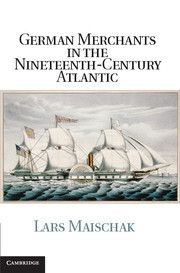Description
German Merchants in the Nineteenth-Century Atlantic
Publications of the German Historical Institute Series
Author: Maischak Lars
Studies the ties between America and Bremen in the nineteenth century, illuminating the role of merchant capital in making an industrial-capitalist world economy.
Language: English
Subject for German Merchants in the Nineteenth-Century Atlantic:
Approximative price 94.05 €
In Print (Delivery period: 14 days).
Add to cart
German Merchants in the Nineteenth-Century Atlantic
Publication date: 04-2013
315 p. · 16.2x24.2 cm · Hardback
Publication date: 04-2013
315 p. · 16.2x24.2 cm · Hardback
Approximative price 34.17 €
In Print (Delivery period: 14 days).
Add to cart
German Merchants in the Nineteenth-Century Atlantic
Publication date: 10-2015
Support: Print on demand
Publication date: 10-2015
Support: Print on demand
Description
/li>Contents
/li>Biography
/li>
This study brings to life the community of trans-Atlantic merchants who established strong economic, political and cultural ties between the United States and the city-republic of Bremen, Germany in the nineteenth century. Lars Maischak shows that the success of Bremen's merchants in helping make an industrial-capitalist world market created the conditions of their ultimate undoing: the new economy of industrial capitalism gave rise to democracy and the nation-state, undermining the political and economic power of this mercantile elite. Maischak argues that the experience of Bremen's merchants is representative of the transformation of the role of merchant capital in the first wave of globalization, with implications for our understanding of modern capitalism, in general.
Index of tables, graphs, and maps; Glossary; Prologue; Introduction; Part I. Moorings of the Hanseatic Network: 1. Prudent pioneers: Hanseats in trans-Atlantic trade, 1798–1860; 2. The Hanseatic household: families, firms, and faith, 1815–64; 3. Cosmopolitan conservatives: home-town traditions and Western ideas in Bremish politics, 1806–60; Part II. Exchanges: In a Transnational World: 4. Free labor and dependent labor: from patronage to wage labor and social control, 1815–61; 5. International improvement: Hanseats, Hamiltonians, and Jacksonians, 1845–60; 6. Nations, races, and empires: Hanseats encounter the other, 1837–59; Part III. Decline of a Cosmopolitan Community: 7. The end of merchant-capital: crisis and adaptation in a world of industrial capitalism, 1857–90; 8. Decisions and divisions: Hanseatic responses to nation-making wars, 1859–67; 9. Patriarchs into patriots: Hanseats in a world of nation-states, 1867–1945; Conclusion; Appendix: maps; Sources; Bibliography.
Lars Maischak is a lecturer in the history department at California State University, Fresno. This study is based on Maischak's dissertation, for which the Friends of the German Historical Institute awarded him the Fritz Stern Prize for the best dissertation in the field of German-American History in 2006.
© 2024 LAVOISIER S.A.S.




